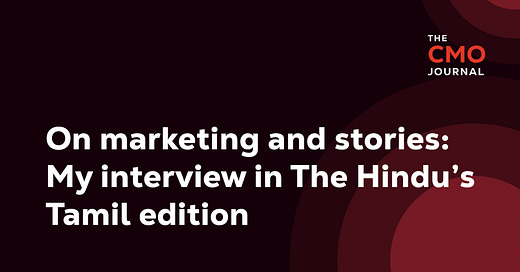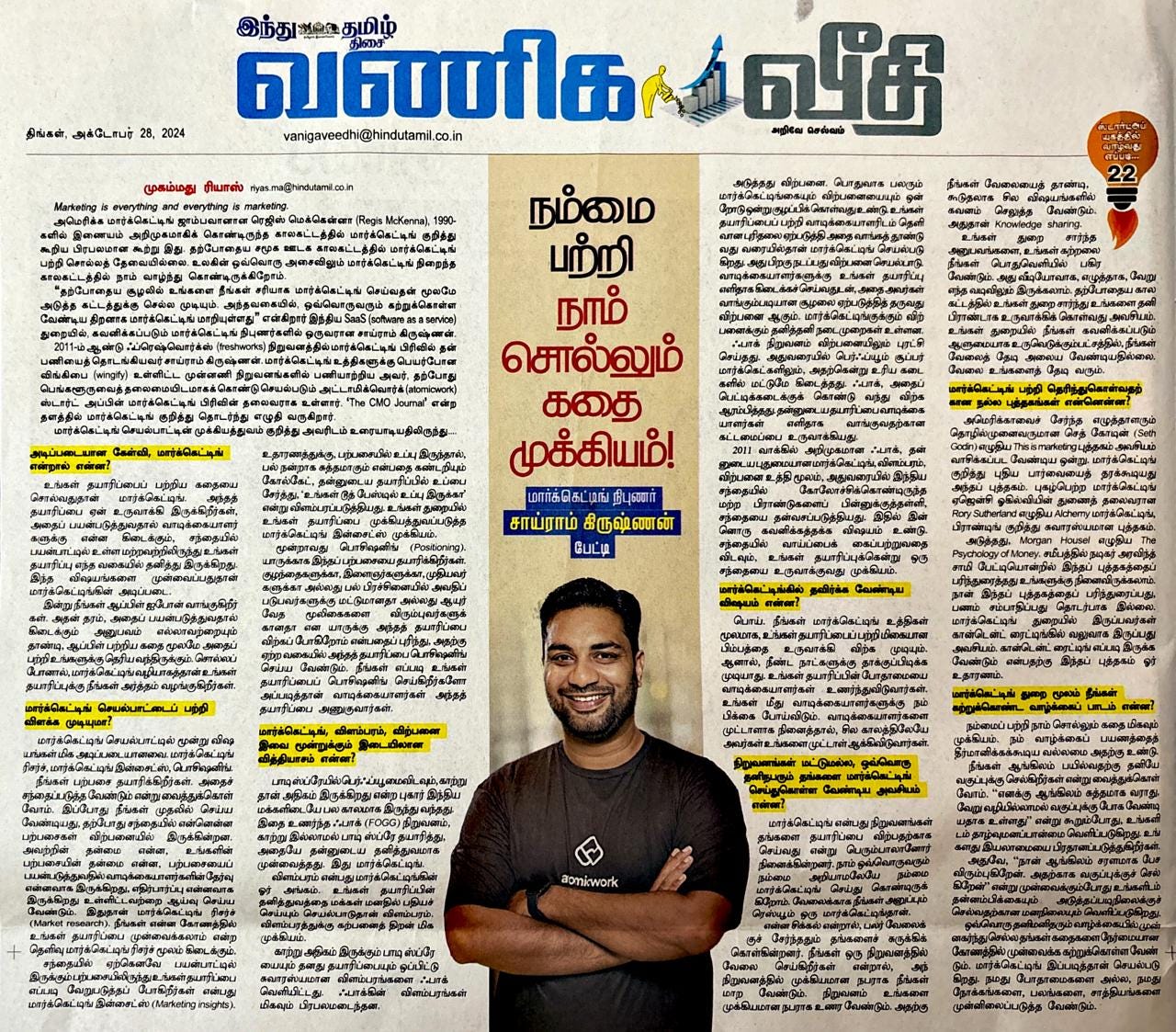Why we need to pay attention to the stories we tell ourselves
A translation of my interview on marketing in The Hindu's Tamil edition
Late last month, I had an interview out in The Hindu’s Tamil edition, on marketing and how it applies to everyday life. Though the interview itself was over 3 hours long, journalist Mohammed Riyas condensed everything I said into a great little Q and A. He also conducted the interview in chaste Tamil, making me fumble for the correct words, and leaving me in awe of his beautiful, literary Tamil. It was a joy to talk to him!
Why did he want to interview specifically me for this section? Because he shares something with you: He is a regular reader of the newsletter! :)
I should state at this point that this was very important to me, as this is the paper my father gets at home, and because my grandfather, and my family, could read about what I do.
Tamil readers can just read what’s above, but since everyone else had been asking for a translation, my colleague found a way to get it done (Thanks, Ida!).
What follows is the translated interview.
Why we need to pay attention to the stories we tell ourselves - An interview by Mohammad Riyas
"Marketing is everything and everything is marketing": This is a famous quote from American marketing legend Regis McKenna from the 1990s when the Internet was just getting started. There's no need to talk about social media marketing these days. We cannot deny that we are living in the era of marketing in every movement of the world.
"You can only go to the next level by marketing yourself properly in the current environment. In that way, marketing has become a skill that everyone needs to learn," says Sairam Krishnan, one of the most sought-after marketing experts in the Indian SaaS industry.
Sairam Krishnan started his career with Freshworks in 2011. He has worked for leading companies including Wingify, which is known for its inbound marketing strategies, and is currently heading the marketing division of Atomicwork. He writes regularly in his newsletter, called The CMO Journal.
I had a conversation with him about the importance of the marketing function.
Q: Let’s start with a basic question, what is marketing?
A: Marketing is about telling the story of your product. Why you have developed that product, what customers will gain by using it, how your product is different from the other products in the market. These are the basics of marketing. You're buying an iPhone today. Apart from its quality and the experience of using it, you would have come to know about it only through the story about Apple. In other words, it's through marketing that you give meaning to your product.
Q: Could you elaborate on marketing strategy, and what it means?
A: Three things are very fundamental in the marketing process: Marketing research, marketing insights, and positioning.
Assume you are making toothpaste. We need to market it. The first thing you need to do is find out what products are currently on the market. What is their nature, what is the nature of your toothpaste, what is the behaviour of the customers in using the toothpaste, what are the expectations, etc. This is market research. Market research will give you a clear idea of the angle from which you can present your product.
Next is the marketing insight. How are you going to differentiate your product from the toothpaste that is already in use in the market? For example, Colgate, added salt to its product and advertised it that way.
The third is positioning: Who are you making this for? We need to understand who we are going to sell the product to, whether it is for children, young people, the elderly or just for those suffering from dental problems, or for those who like Ayurvedic herbs. The way you position your product is how customers will approach that product.
Q: What's the difference between marketing, advertising, and sales?
A: There has long been a complaint among consumers that there is more air in body-spray than perfume. With this insight, FOGG developed a body spray with more perfume, less air, and presented it that way. This is marketing.
Advertising is a part of marketing. Advertising is the act of making people think about your product. Creativity is very important in advertising. Fogg ran interesting ads comparing their product to an air-based body spray. These became incredibly popular, and had great recall.
Next is sales. A lot of people confuse marketing and sales. Marketing only works as long as it gives the customer a clear understanding of your product and motivates them to buy it. And then there is the sales process. Selling is making your product easily available to customers and giving them an environment in which to buy it.
Consider how Fogg innovated in sales. Until then, perfume was only available in supermarkets and specialty stores. Fogg brought their perfumes to the kirana store. This created a framework for customers to buy the product easily.
Launched in 2011, Fogg has now outperformed other brands in the Indian market with its innovative marketing, advertising, and sales strategy.
There's one other thing to bear in mind when thinking about this: Creating a market for your product is more important than capturing the opportunity in the market.
Q: What should you avoid in marketing?
A: Lies. You can create and sell a great image about your product through marketing. But it can't be sustained for long. Customers will notice the quality of your products and your customer service, and will quickly abandon you and your product.
Q: Why is it necessary for every individual, not just companies, to market themselves?
A: Most people think that marketing is what companies do to sell themselves. But we're all marketing ourselves without knowing it. A resume you send for work is marketing. How you dress for the interview is marketing.
What's problematic is that many people shortchange themselves when it comes to work. In today's time, it is important to create your own brand. If you emerge as a thought leader, as someone who knows their job in your field, you don't have to look for work. Work will find you.
Q: What are some good books to read about marketing?
A: This is Marketing, by Seth Godin. Alchemy, by Rory Sutherland, vice president of the famous marketing agency Ogilvy. And finally, The Psychology of Money, by Morgan Housel. I don't recommend this book to learn about marketing. However, those who are in the field of marketing need to be strong in writing. This last book is an example of how well you can write by using simple structure and vocabulary.
Q: What is the most important lesson you have learnt in the field of marketing?
A: We need to pay attention to the stories we tell ourselves. They have the power to shape our lives. Suppose you are going to an English class. If you think, "I don't speak English. I have no other option but to go to class," you're focusing on your disability. But if you think, "I want to speak English. That's why I go to class,", it will give you the mindset to go to the next level. Every individual must learn to present their stories in a positive angle to move ahead in life. That's how marketing works as well: We need to highlight not our inadequacies, but our objectives, strengths, and possibilities.
Also, a special announcement!
This Thursday night/Friday morning IST (It’s a 12 am slot!), I’m speaking at Full Circle, the virtual conference for small B2B marketing teams, on a favourite topic of mine: How Not to Measure your Startup Marketing.
You can register here. I know it’s late, but would love to see you there. I have a great collection of stories about this! :)
Finally, this is your weekly reminder to share the newsletter on LinkedIn, or among your friends and colleagues who might be interested.
And if you haven’t subscribed yet, please do! There are at least 2 killer essays to go before we start winding down the year.





